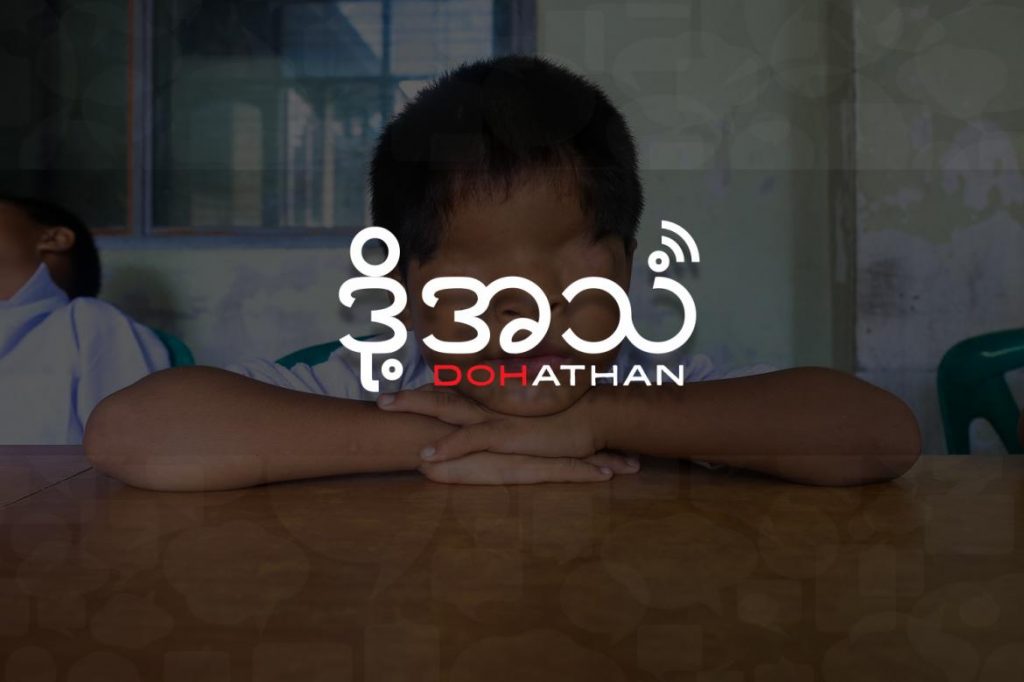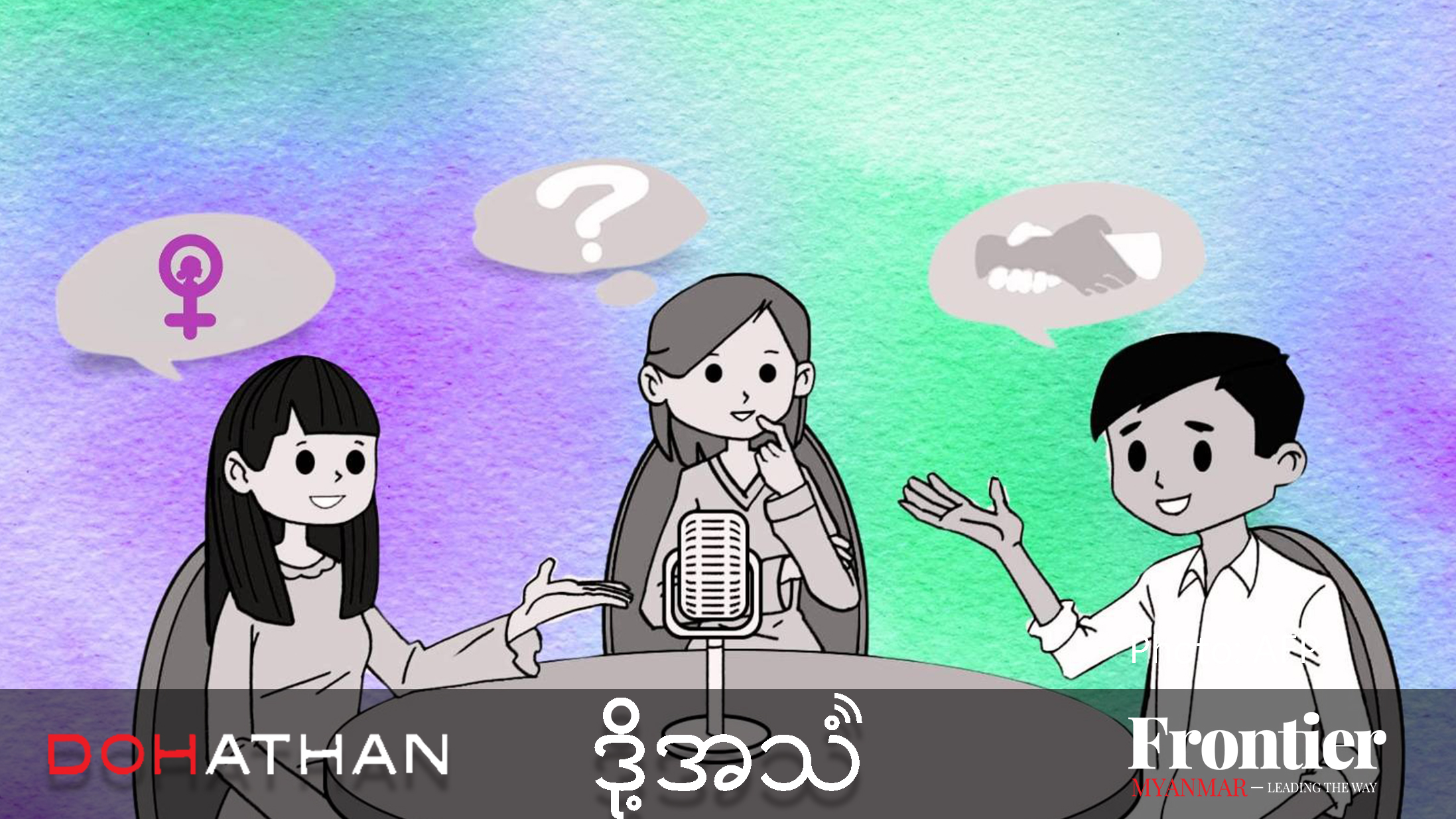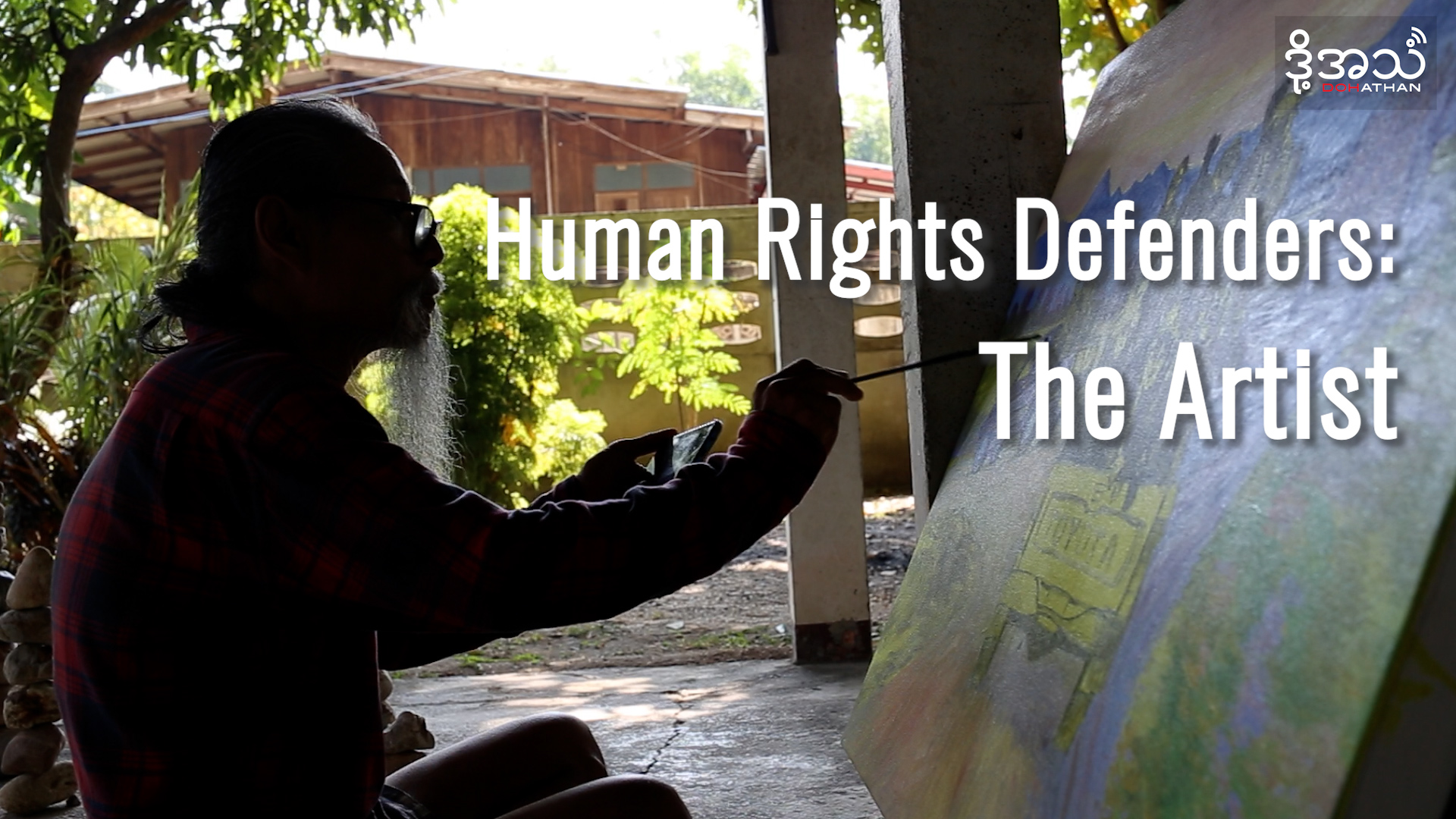This week we will be looking at some of the challenges faced by people with disabilities to receiving education in Myanmar, and mark World Human Rights Day on December 10.
Episode 8 Script
Win Zar Ni Aung: Mingalabar, welcome to Doh Athan, a new weekly podcast from Frontier Myanmar. I am Zar Ni.
This week we will be looking at some of the challenges faced by the disabled community and how these challenges can be overcome.
We also will take a closer look at the status of human rights in Myanmar as we recognise the upcoming World Human Rights Day on December 10.
Support more independent journalism like this. Sign up to be a Frontier member.
Htet Htet Naing: In Myanmar, most people are willing to show their sympathies for the disabled. But there are few opportunities in education and labor for those with disabilities.
Myanmar signed the UN Convention on the Rights of People with Disabilities in 2011 and also adopted the Disability Rights Law in June 2015. But local implementation of the Disability Rights Law has not yet taken place.
Implementation equal education and a barrier-free environment for the disabled, as mentioned in that law, has been weak.
22-year-old Thet Su San is third year philosophy student with a visual impairment from East Yangon University. Formerly, she attended Kyimyindaing School for the Blind. She became blind when she was in Grade 9, and she had some difficulties in learning at normal schools. But, she has ideas for other disabled people who have difficulties while in normal schools.
Thet Su San: At normal schoos, there should be a sidewalk for us, especially the blind. And the signage of the classrooms should be not just with visual language but also braille so we can contact other people in a convenient way. Even though it would be really expensive to publish textbooks in braille, if it happens, we can learn easily like normal people.
Htet Htet Naing: Currently, there are 12 special schools in Myanmar, providing education for children with hearing, visual and intellectual impairments, based in Yangon and Mandalay. Kyimindaing School for the Blind is the most attended school for the disabled. This school provides primary and secondary education. For higher education, the students have to go to normal schools which have agreements with the blind school. Su Su Mar, Headmistress of Kyimindaing School for the Blind explains how they provide education for blind students.
Su Su Mar: For primary education, we have the necessary teaching aids for children. And they have a chance to learn with teachers who understand the braille so they understand all lessons. But older students who have to go outside schools have difficulties as they have to learn together with normal students. To understand all lessons, they need more time. So, after school, the teachers from our school work with them as resource teachers. On weekends, we find volunteers who can tutor them in the subjects they are poor in, especially English and mathematics. For high school students, we provide tutors and study guides.
Htet Htet Naing: According to the 2014 Census, about 2.3 million in Myanmar are disabled. Half of them are away from school due, according to the Ministry of Social Welfare. In this survey, we notice that only a small amount of disabled students pursue higher education. Only one out of every 100 disabled people can attend university.
Su Su Mar: Mainly, they don’t know the right information. So, the surrounding people have to spread the information. Even of some people are illiterate, they can listen to FM radio. We asked most of the parents who enrolled their children in our school about how they know us and they said via FM.
Htet Htet Naing: Children with disabilities have been denied admittance to normal, leading to a lot of difficulties physically and mentally in education. Thet Su San made some suggestions to reduce the amount of illiterate people with disabilities.
Thet Su San: There are around 300, 400 or 500 students in normal school due to compulsory education. So, I wish that kind of education will come true in reality for the disabled. If we can easily attend normal schools or the disabled are being sent to the special schools, I believe the illiteracy rate for people with disabilities will drop.
Win Zar Ni Aung: We will now look at the situation of human rights in Myanmar ahead of World Human Rights Day on December 10.
The attention on human rights in Myanmar has never been more in focus than it is today.
The humanitarian crisis unfolding in Rakhine and in Bangladeshi refugee camps has prompted an unprecedented response from activists, campaigners and international governments.
Not to mention the refugee crisis brought about by conflict in Kachin and Shan states. Or the plight of the disabled, child prisoners, underpaid workers or sexual abuse victims.
As Myanmar attempts to work towards becoming a fully-fledged democracy, the scrutiny on human rights here has intensified.
For the past two weeks Myanmar has been showcasing a number of campaigns to help focus attention on many groups within society who are suffering.
It will culminate with World Human Rights Day on December10.
Today Doh Athan hears why it is important to recognize such events in Myanmar.
U Aung Myo Min, director of Equality Myanmar, which facilitates human rights training and advocacy programs for grassroots organisations, political parties and the wider community, said that human rights are essential.
Aung Myo Min: Human rights are important not only Myanmar people but also all the people around the world. But human rights are very important in Myanmar because Myanmar is a country that has violated human rights for many years. Like oxygen is important for humans to survive, Myanmar people also need human rights. Myanmar people need equal rights without discrimination on the basis of gender, sexuality and ethnicity like another countries around the world.
As the government can’t raise awareness on human rights, instead there has been the spread of propaganda against human rights. So, there will need to be a correct awareness around human rights.
Win Zar Ni Aung: Human Rights Day is celebrated annually across the world on December 10 every year because the universal declaration of human rights was signed by the UN General Assembly in Paris on 10 December 1948 as a consequence of the Second World War.
Myanmar was one of the first countries to sign up to the declaration and Myanmar’s record on human rights has been chequered since it signed the UN’s universal declaration of Human rights in 1948, often being cited as one of the worst nations on earth.
Between 1962 and 2011 Myanmar’s people suffered many well-documented human rights abuses under the country’s former military regime.
After the end of junta there were some improvements. During Thein Sein’s government, many political prisoners were released.
It was hoped things would improve further when the NLD swept to power under its ‘Time for Change’ slogan in 2015.
Daw Khin Lay, director of Triangle Women’s Support group, said it will take time for Myanmar people to enjoy human rights.
Khin Lay: Human rights were limited while under the military dictatorship, even though Myanmar signed the declaration of human rights in 1948. They are still weak on international treaties even though they signed the Convention on the Elimination of all Forms of Discrimination Against Women and the Convention on the Rights of the Child. It will take time to get human rights fully for Myanmar people.
Win Zar Ni Aung: Nickey Diamond, of human rights organization Fortify Rights, said that human rights violations have increased in recent years.
Nickey Diamond: Human rights violations have increased. There is no transparency and international standards on development projects, especially coal projects. Local people have suffered more violations of human rights because there is no cooperation with local people from the government. Besides, innocent people are also dying and losing their rights because of civil wars, especially in Kachin and Shan states. In some cases there have been restrictions on humanitarian aid from the government side.
Win Zar Ni Aung: We hope you enjoyed this edition of Doh Athan.
This programme was put together this week by Zar Ni and A Htet.
You can read the above-mentioned news and other interesting articles via Frontier Myanmar’s website and Facebook pages and you can share your thoughts.
Please stay tuned for next Wednesday’s episode and visit the Doh Athan Facebook page.
The project to support human rights reporting is a partnership between Frontier Myanmar and Fondation Hirondelle, funded by the Embassy of the Netherlands in Myanmar.
Thanks for staying with us while broadcasting.
Have a nice day.







